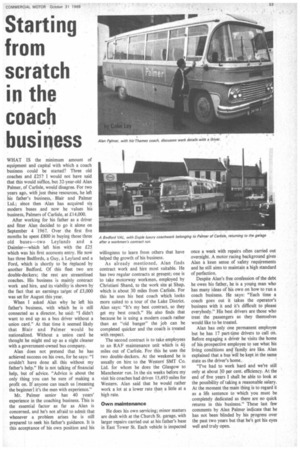Starting from scratch in the coach business
Page 55

If you've noticed an error in this article please click here to report it so we can fix it.
WHAT IS the minimum amount of equipment and capital with which a coach business could be started? Three old coaches and /25? I would not have said that this would suffice, but 32-year-old Alan Palmer, of Carlisle, would disagree. For two years ago, with just these resources, he left his father's business, Blair and Palmer Ltd.; since then Alan has acquired six modern buses and now he values his business, Palmers of Carlisle, at £14,000.
After working for his father as a driver and fitter Alan decided to go it alone on September 4 1967. Over the first five months he spent ,E800 in buying those three old buses—two Leylands and a Daimler—which left him with the £25 which was his first accounts entry. He now has three Bedfords. a Guy, a Leyland and a Ford, which is shortly to be teplaced by another Bedford. Of this fleet two are double-deckers; the rest are streamlined coaches. His business is mainly contract work and hire, and its viability is shown by the fact that an earnings target of £3,000 was set for August this year.
When I asked Alan why he left his father's business, with which he is still connected as a director, he said: "I didn't want to end up as a bus driver without a union card." At that time it seemed likely that Blair and Palmer would be nationalized. Without a union card he thought he might end up as a night cleaner with a government-owned bus company.
Alan does not pretend that he has achieved success on his own, for he says: "I couldn't have done all. this without my father's help." He is not talking of financial help, but of advice. "Advice is about the only thing you can be sure of making a profit on. If anyone can teach us [meaning the beginner] it's the men with experience."
Mr. Palmer senior has 40 years' experience in the coaching business. This is the essential factor as far as Alan is concerned, and he's not afraid to admit that whenever a problem arises he is still prepared to seek his father's guidance. It is this acceptance of his own position and his willingness to learn from others that have helped the growth of his business.
As already mentioned. Alan finds contract work and hire most suitable. He has two regular contracts at present; one is to take motorway workmen, employed by Christiani Shand, to the work site at Shap. which is about 30 miles from Carlisle. For this he uses his best coach which looks more suited to a tour of the Lake District. Alan says: "It's my best contract, so they get my best coach." He also finds that because he is using a modern coach rather than an "old banger" the job can be completed quicker and the coach is treated with respect.
The second contract is to take employees to an RAF maintenance unit which is 4; miles out of Carlisle. For this he uses the two double-deckers. At the weekend he is usually on hire to the Western SMT Co. Ltd. for whom he does the Glasgow to Manchester run. In the six weeks before my visit his coaches had driven 15.493 miles for Western. Alan said that he would rather work a lot at a lower rate than a little at a high rate.
Own maintenance He does his own servicing; minor matters are dealt with at the Church St. garage, with larger repairs carried out at his father's base in East Tower St. Each vehicle is inspected once a week with repairs often carried out overnight. A motor racing background gives Alan a keen sense of safety requirements and he still aims to maintain a high standard of perfection.
Despite Alan's free confession of the debt he owes his father, he is a young man who has many ideas of his own on how to run a coach business. He says: "Each time a coach goes out it takes the operator's business with it and it's difficult to please everybody." His best drivers are those who treat the passengers as they themselves would like to be treated.
Alan has only one permanent employee but he has 17 part-time drivers to call on. Before engaging a driver he visits the home of his prospective employee to see what his living conditions and family are like. Alan explained that a bus will be kept in the same state as the driver's home.
"I've had to work hard and we're still only at about 30 per cent. efficiency. At the end of five years I shall be able to look at the possibility of taking a reasonable salary. At the moment the main thing is to regard it as a life sentence to which you must be completely dedicated as there are no quick returns in this business." These last few comments by Alan Palmer indicate that he has not been blinded by his progress over the past two years but that he's got his eyes well and truly open.


























































































































